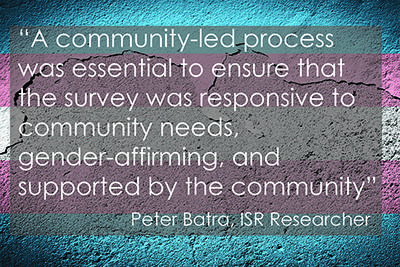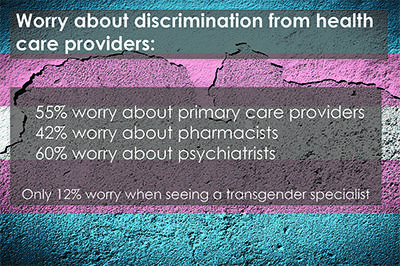December 12, 2018
Finding Our Strength
Transgender adults' daily lives are filled with discrimination, worry, anxiety, and actions taken to brace for discrimination, according to a survey of 316 transgender-gender non-conforming (TGNC) U.S. adults led by Transcend the Binary, a transgender advocacy organization in Ferndale, Michigan with assistance from U-M researchers. The TGNC community shows resiliency through its efforts to advocate for individual gender identity recognition and respect, and its strong within-community support systems.
 The survey, Finding our Strength, was a community-led effort in determining its research objectives, questionnaire development, analysis and sharing of results. 'A community-led process was essential to ensure that the survey was responsive to community needs, gender-affirming, and supported by the community,' said ISR researcher, Peter Batra responsible for the survey data analysis. Transcend the Binary assembled a core research team, identified TGNC community members for focus group participation, and brought forward scores of individuals to assist with the survey development and data interpretation. 'A community-led process creates synergy by building on trust, learning through shared experiences, skill sharing and collaborative decision making' explains Transcend the Binary co-founder and Executive Director, Brayden Misiolek.
The survey, Finding our Strength, was a community-led effort in determining its research objectives, questionnaire development, analysis and sharing of results. 'A community-led process was essential to ensure that the survey was responsive to community needs, gender-affirming, and supported by the community,' said ISR researcher, Peter Batra responsible for the survey data analysis. Transcend the Binary assembled a core research team, identified TGNC community members for focus group participation, and brought forward scores of individuals to assist with the survey development and data interpretation. 'A community-led process creates synergy by building on trust, learning through shared experiences, skill sharing and collaborative decision making' explains Transcend the Binary co-founder and Executive Director, Brayden Misiolek.
This community-led process was evident in the manner in which gender identity data was collected. 'Transcend the Binary is adamant that gender identity is defined by the individual and that respect must be given to each person's authentic gender,' stated Misiolek. Thus, gender identity was asked through an open-ended question. This resulted in over 120 unique gender identities being reported: a perfect illustration that gender identity lies across a spectrum that goes far beyond the binary. Survey respondents reported that they identified as TGNC at an average age of 18 years and were open to others about their gender at an average age of 20. However, the age range at which these events occurred varied greatly with older respondents being more likely to have waited decades before revealing their authentic gender identity to others.
Since there is no national sampling frame available for the TGNC community, the survey relied on a convenience or snowball' recruitment method for participants. Transcend the Binary led the recruitment process through community outreach and social media messaging. This yielded a population that was typically less than 30 years old, white, had at least some college education and reported a low household annual income. These population characteristics were similar to the participant characteristics of the U.S. National Transgender Survey (2015).
A major survey finding was the high percentage of participants that reported anxiety. Using the General Anxiety Disorder-7 scale, four of five respondents reported some degree of anxiety with over 30% reporting severe anxiety. 'This level of anxiety is higher than that reported in the literature, but was felt to be a valid finding by our local TGNC community,' said Caitlin Tupper, LCSW, of Transcend. 'Among our respondents higher anxiety was associated with less family support, lower self-reported health status and coping through avoidance or social isolation.'
 The survey expanded the information about experienced discrimination reported in the U.S. National Transgender Survey by focusing on discrimination worry and actions taken in anticipation of discrimination (i.e., hypervigilance). Ninety-eight percent of respondents reported worrying about discrimination in personal or social situations at home or at family or social gatherings. Discrimination was also present in healthcare settings. About half (55%) of respondents worried about discrimination from primary care providers, while 42% and 60% worried about discrimination from pharmacists and psychiatrists, respectively. Only 12% worried about discrimination when seeing a transgender specialists. 'The results indicate that education about transgender health and gender-affirming care can help to lower discrimination worry,' says Misiolek.
The survey expanded the information about experienced discrimination reported in the U.S. National Transgender Survey by focusing on discrimination worry and actions taken in anticipation of discrimination (i.e., hypervigilance). Ninety-eight percent of respondents reported worrying about discrimination in personal or social situations at home or at family or social gatherings. Discrimination was also present in healthcare settings. About half (55%) of respondents worried about discrimination from primary care providers, while 42% and 60% worried about discrimination from pharmacists and psychiatrists, respectively. Only 12% worried about discrimination when seeing a transgender specialists. 'The results indicate that education about transgender health and gender-affirming care can help to lower discrimination worry,' says Misiolek.
A key component of community-led research is sharing the information not only with the TGNC community but with the wider public along with translating survey findings into action. Transcend the Binary has led such an effort via multiple initiatives including an interactive art exhibit of the findings, educational programs for health practitioners, students, and at public health and transgender health conferences, and general public presentations like the one held at ISR in November 2018. It has also used its findings to inform its own client advocacy and support work.
'Our research is just a glimpse into the lives of the TGNC community,' says Nancy JW Lewis, PharmD, MPH a U-M co-investigator. 'Ways to bring the voices of those most marginalized within the community, including persons of color and the elderly, into future research is needed.'
Information about Transcend the Binary is available at www.transcendthebinary.org, along with a report of more detailed survey results: http://www.transcendthebinary.org/wp-content/uploads/2017/12/Finding-Our-Strength-Survey-Report.pdf